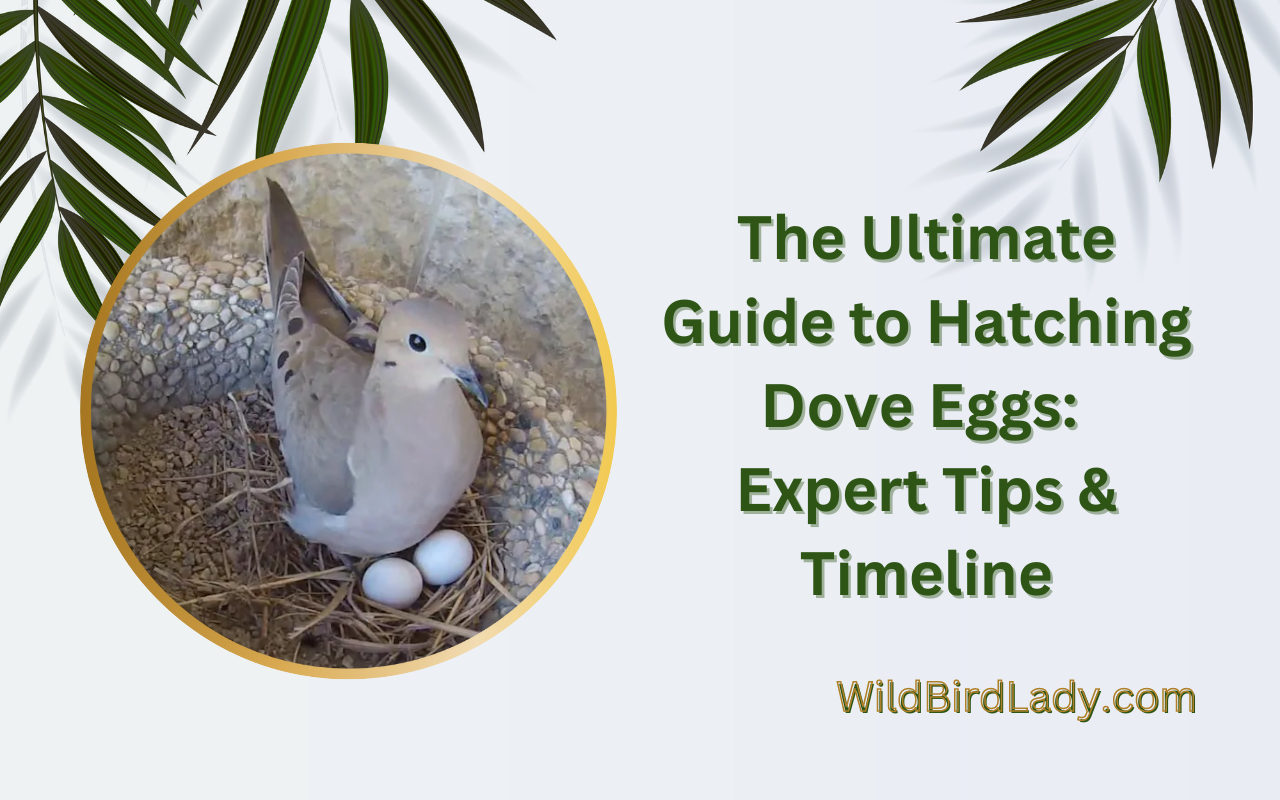🐥 Lovebirds need proper care to stay healthy and happy. Here are five essential tips to help you care for your feathered friends: Observe their body language, Listen to their vocalizations, Spend time together, Providing Essential Toys And Accessories, and Offer swings, ladders, and mirrors.
Welcome to the Ultimate Guide to Hatching Dove Eggs, where we’re about to embark on an egg-citing journey filled with feathers, coos, and a whole lot of nesting fun! Whether you stumbled upon a dove’s nest in your backyard or are a budding bird enthusiast, this guide is your ticket to becoming an expert egg hatcher.
Ever wondered how doves manage to turn a fragile egg into a fluffy little bird? We have all the answers and insider tips you need to make your dove egg-hatching experience successful. From understanding the magical incubation process to creating the perfect nest environment, we’ll guide you through every step with a touch of feathered humour and playful anecdotes.
But why should you keep reading? Besides the sheer joy of witnessing new life take flight, hatching dove eggs is a mesmerizing journey connecting us with nature’s miracles. Plus, we’ll unveil the ultimate timeline for your hatch-a-palooza, ensuring you’re prepared for every chirp, wiggle, and adorable hatchling arrival. So, grab your nest-building materials, put on your avian thinking cap, and let’s dive into the whimsical world of hatching dove eggs together!

Credit: silkiechickenexperts.com
Understanding Dove Eggs
Dove eggs are small, delicate and fascinating to observe throughout the various stages of their development. Understanding dove eggs can help encourage a successful hatching process. Here are some things to consider:
Physical Characteristics Of Dove Eggs
- Dove eggs are oval-shaped and come in various sizes depending on the species. For example, a mourning dove’s egg is around 1.25 inches long and 0.9 inches wide.
- Their colors vary from ivory to pinkish buff and have a smooth texture.
- The shell is fragile and translucent, making it possible to see the developing embryo inside.
Common Types Of Dove Eggs And Their Unique Features
- The most common species of doves kept as pets include diamond doves, zebra doves, and ring-necked doves, each with its own variation of egg size and color.
- Ring-necked doves lay white, smooth, and shiny eggs, while diamond doves lay cream-colored eggs with a rough surface. Zebra doves, on the other hand, lay smaller, plain, white eggs with a silky texture.
Optimal Time For Dove Eggs To Be Laid
- Doves reach sexual maturity at around six months of age.
- Dove breeding season varies depending on the species, climate, and geographical location but generally occurs in the spring and summer months.
- It is best to wait until the female is at least a year old before breeding.
Factors Affecting Dove Egg Fertility And Viability
- The temperature of the environment and the incubator should be maintained between 99 and 101 degrees fahrenheit. Anything outside this range can reduce the chances of fertile eggs.
- The humidity level plays a vital role in successful hatching. The optimal humidity level is between 50% to 70%.
- A balanced and nutritious diet boosts fertility, as does stress reduction.
Understanding the physical characteristics of dove eggs, common types of doves, the optimal time for breeding, and factors affecting dove egg fertility and viability can help you to successfully hatch these fascinating creatures. Keep in mind the optimal conditions for each stage of development, and provide the necessary care to retain healthy and fertile eggs.
Pre-Incubation Preparation
Proper Selection Of Mating Doves
If you desire to hatch dove eggs successfully, you need to ensure selecting compatible mates to set the foundation for a healthy and happy environment. Here are some tips to help you on how to choose the right birds:
- Pick doves of the same species of similar weight and size.
- Observe doves’ behavior and make sure they are compatible with each other.
- Look for doves that are healthy, with clear eyes, smooth feathers, and no signs of disease.
Creating A Suitable Nesting Area For Dove Eggs
Doves need a comfortable and secure place to lay their eggs. Here are some useful tips to help you create a suitable nesting area for dove eggs:
- Provide a spacious nesting box filled with soft, clean bedding, such as hay or wood shavings.
- Ensure the nesting box is located in a calm, quiet area that provides adequate warmth and ventilation.
- Place the nesting box in a secure area away from predators and where the birds can easily access food and water.
Feeding The Doves With Nutritious Meal Prior To Egg-Laying
Proper nutrition is essential for doves to build healthy eggs and prepare for egg-laying. It is also crucial to ensure the health of the chicks. Here are some tips to help you feed your doves properly:
- Feed your doves a nutritious and balanced diet that includes seeds, fresh fruit, and vegetables.
- You can also supplement their diet with specially-formulated commercial bird food to ensure they receive all the necessary nutrients.
- Provide your birds with clean water at all times.
Ensuring A Clean And Hygienic Environment For Dove Eggs
A clean environment is necessary to maintain healthy eggs and ensure the successful hatching of dove eggs. Here are some essential tips for maintaining a clean and hygienic environment for dove eggs:
- Clean the nesting box regularly, removing any dirt or debris that may have accumulated.
- Use warm water and mild soap to clean the nesting box and any surrounding areas.
- Rinse the nesting box thoroughly and leave it to dry before adding fresh bedding.
- Disinfect the nesting box with bird-safe disinfectant before putting it back in place.
By following these tips, you can create a suitable environment for your doves to lay eggs and help ensure a successful hatching process. Remember to monitor your doves closely throughout the process and provide them with proper care and attention.
Good luck with your dove egg hatching!
Incubation Process
How To Ensure The Proper Temperature And Humidity Levels For Dove Egg Incubation
Proper temperature and humidity are crucial for hatching healthy dove eggs. To achieve the best results, follow these tips:
- Keep the temperature between 99.5°f and 100.5°f.
- Maintain the humidity level at around 50% to 55% for the first 10 to 12 days, then increase it to 65% to 70% for the remaining days of incubation.
- Place a thermometer and a hygrometer inside the incubator to monitor the temperature and humidity levels.
- Avoid opening the incubator frequently as it affects the temperature and humidity levels.
Turning Dove Eggs For Optimal Results
Turning dove eggs consistently can help prevent the embryos from sticking to the shell and aid in the circulation of oxygen in the eggs. Follow these steps for optimal results:
- Turn the eggs three to five times a day.
- Use a permanent marker to make an “x” on one side of each egg and an “o” on the opposite side. This step will ensure that you turn the egg correctly and avoid confusion.
- Turn the eggs at different times of the day and night to ensure even heating.
Maintaining The Ideal Environment For Hatching
The optimal environment for hatching dove eggs includes:
- Placing the incubator in a quiet and dark place to avoid disturbing the eggs.
- Providing adequate ventilation to ensure fresh air circulation.
- Allowing enough space between the eggs to allow for even heating and circulation of air.
Expert Tips For Checking On Eggs During Incubation
As the incubation process continues, checking on the eggs regularly can help you identify any issues and take the necessary action. Follow these tips:
- Do not open the incubator too frequently, as this may cause temperature and humidity fluctuations.
- Visually inspect the eggs for any cracks, abnormalities, or discoloration. Remove any eggs that appear to be dead or contaminated as they can affect the rest of the eggs.
- Candle the eggs between days seven to ten to check for any signs of development.
- Use your senses of smell and sight to check for any signs of bacterial infection or foul odors.
By following these tips, you can ensure that your dove egg incubation process is successful, and you hatch healthy chicks.
Hatching And Caring For Baby Doves
Doves are beautiful birds famous for their gentle cooing sound, and they make great pets. However, hatching dove eggs can be quite challenging, and it requires great care, effort, and patience. In this section, we will cover the timeline for dove egg hatching from incubation to baby dove, critical steps in caring for hatchlings, common issues encountered during dove egg hatching and how to resolve them, and providing proper nutrition and care for baby doves.
Timeline For Dove Egg Hatching From Incubation To Baby Dove
Hatching dove eggs is critical because baby doves are fragile and require utmost care and attention. Below is a timeline for dove egg hatching:
- Incubation period: 14 – 17 days
- Hatching time: Day 18
- Fledgling stage: Day 21 – day 28
Critical Steps In Caring For Hatchlings
As soon as the baby dove hatches, it must be kept warm, and the following steps should be taken to provide proper care:
- Keep the baby dove in a safe and warm place with a temperature of about 90-95°f, using a heat lamp or a heating pad.
- Provide clean water, but avoid using deep dishes since the baby dove can easily drown. The shallow dish or a small container with water will be suitable for drinking and bathing.
- Place a soft towel or fleece in the nesting box to offer some softness for the baby dove. Remove soiled material frequently.
- Observe the baby dove for a few days and ensure they are fed regularly. They may need to be fed mashed hard-boiled egg yolk with a small bird-feeding syringe.
Common Issues Encountered During Dove Egg Hatching And How To Resolve Them
Hatching dove eggs can be challenging, and several issues might arise. Here are common problems and how to resolve them:
- Delayed hatching: If the eggs fail to hatch after 20 – 21 days, the eggs may be infertile, improperly incubated, or contain a dead embryo. Check for candling to confirm the embryo’s state.
- Chilling and dehydration: Newborn hatchlings cannot regulate their body temperature, which can lead to chilling or dehydration. Keep the baby dove warm and humid to prevent this scenario.
Providing Proper Nutrition And Care For Baby Doves
Proper nutrition is essential for baby doves’ growth and development, and the following should be provided:
- A high-quality pigeon-specific bird seed mix containing millet, sunflower seeds, and safflower will suffice for the pigeons’ nutritional needs.
- Soaked, cooked lentils and dark leafy greens provide essential nutrients.
To sum up, hatching dove eggs and caring for baby doves requires great patience and attention. Following the tips and steps highlighted above will increase your chances of success, making the process much more comfortable for everyone involved.
Frequently Asked Questions
What Is The Incubation Period For Dove Eggs?
Dove eggs typically take about 14 days to hatch. However, the exact incubation period can vary depending on factors such as temperature and humidity levels.
How Do I Incubate Dove Eggs At Home?
You can incubate dove eggs at home using an incubator or a homemade setup. Make sure to regulate temperature and humidity levels carefully throughout the incubation period.
What Should I Expect During The Hatching Process?
During hatching, you may notice the eggs wobbling or see cracks appearing on the surface. Once the chicks start to break free from the shells, it can take several hours for them to hatch fully.
Conclusion
As you have read throughout this guide, dove egg incubation and hatching time is a delicate process requiring patience and attention to detail. Understanding the optimal temperature and humidity levels and the ideal conditions for turning the eggs is essential for a successful hatching process.
Following the steps outlined in this guide will give you a strong start in your dove breeding journey, allowing you to successfully care for your dove’s eggs and ensure that they hatch into healthy chicks. Remember to keep in mind that each dove’s behavior and circumstances may vary, so it’s important to adapt your approach accordingly.
With the right approach, you’ll be a dove incubation and hatching pro in no time!
Latest Posts
The Ultimate List: Top 8 Best Birdwatching Podcasts for Avid Birders
Looking for the top birdwatching podcasts? Here are the eight best options to tune into today! Birdwatching can be a thrilling, immersive experience that brings...
Stop Squirrels in Their Tracks: 10 Effective Ways to Safeguard Your Bird Feeder Pole
To prevent squirrels from climbing your bird feeder pole, use squirrel baffles and slippery poles. Here are ten effective ways to keep squirrels from stealing bird food and damaging bird feeders. ...


